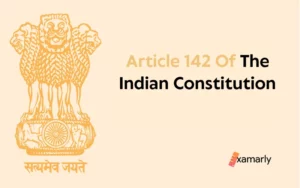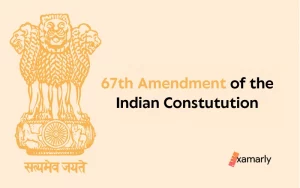Article 179 of the Indian Constitution outlines the provisions for vacating office, resigning from office, and being removed from office for both the Speaker and the Deputy Speaker.
The constitutional provisions of this article state that a motion for the removal of a Speaker or Deputy Speaker can be moved only if it is supported by a majority of all members of the House.
This page provides you with a thorough understanding of Article 179’s provisions and aids in your comprehension of its main points.
- Provisions Of Article 179 Of The Indian Constitution
- Is Article 179 (c) Limits The Speaker's Authority?
- Conclusion
- FAQs On Article 179
- Can Speaker Preside During The Notice Of Resolution Of His Removal Pending?
- What Is Article 179(c) Of The Indian Constitution?
- What Is The 10th Schedule Of The Indian Constitution?
- How Speaker Of The Legislative Assembly Can Resign From His Post?
- To Whom Deputy Speaker Address His/Her Letter Of Resignation?
- When Speaker Or Deputy Speaker Of LA Can Vacate Their Position?
Provisions Of Article 179 Of The Indian Constitution
Article 179 of the Indian Constitution deals with the vacation, resignation, and removal from office of both the Speaker and Deputy Speaker.
An assembly member who serves as the speaker or deputy speaker—
(a) is required to step down from his position if he is no longer a member of the Assembly;
(b) has the ability to resign from his position at any time by submitting a letter of resignation written under his own hand and addressing it, if the member is the Speaker, to the Deputy Speaker, and if the member is the Deputy Speaker, to the Speaker; and
(c) may be ousted from his position if a resolution is passed by the Assembly and received support from a majority of the members of the Assembly at the time the resolution was passed:
A resolution for the objectives of clause (c) may not be introduced without first giving at least 14 days notice of the intention to introduce the resolution:
With the additional caveat that, in the event of a dissolution of the Assembly, the Speaker must remain in office until just before the first assembly meeting following the dissolution.
Is Article 179 (c) Limits The Speaker’s Authority?
According to clause “c” of Article 179, a notice period of 14 days is required to bring such a resolution forward. As a result, the Speaker’s authority is constrained, and once a motion of this kind has been proposed, the Speaker is unable to exclude anyone from consideration.
Conclusion
The Speaker or Deputy Speaker may be dismissed in accordance with Article 179. In the recent case of Keisham Meghachandra Singh v. the Hon’ble Speaker Manipur Legislative Assembly & Ors. (2020), the Supreme Court made a key recommendation about the Speaker’s powers of disqualification. The Court was making a decision regarding the Tenth Schedule’s provision that disqualifies Members of the Legislative Assembly (MLAs) from serving in the Manipur Legislative Assembly.
FAQs On Article 179
Can Speaker Preside During The Notice Of Resolution Of His Removal Pending?
The Speaker or Deputy Speaker may not preside while a resolution for removal is being discussed. During this timeframe, the role of Speaker will be filled by either the person determined by the Assembly or another person specified in the rules of the Assembly.
What Is Article 179(c) Of The Indian Constitution?
According to the constitution, the Speaker or Deputy Speaker may be dismissed from their position if the legislative assembly approves the resolution with a majority of the members present. It is necessary to provide a notice of intention to move a resolution at least 14 days in advance, which must be done before the resolution can be moved.
What Is The 10th Schedule Of The Indian Constitution?
Members of State Legislatures and Members of Parliament may be disqualified for serving on the grounds of defection according to provisions outlined in the 10th Schedule.
How Speaker Of The Legislative Assembly Can Resign From His Post?
The Speaker of the State LA is able to resign from his office at any time by submitting a letter of resignation written in his own handwriting and addressed to the Deputy Speaker of the Assembly of the State.
To Whom Deputy Speaker Address His/Her Letter Of Resignation?
By presenting a letter of resignation addressed to the Speaker and written in his own hand, the Deputy Speaker of LA has the authority to resign from his office at any moment. Such provision is put forth in Clause (b) of Article 179.
When Speaker Or Deputy Speaker Of LA Can Vacate Their Position?
If Deputy Speaker or Speaker is no longer a member of the legislative assembly of State then he or she vacates their Chair. This provision is specified in Clause (a) of Article 179 of the Indian Constitution.






